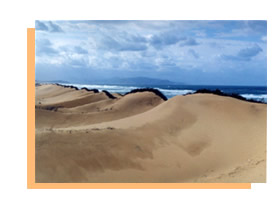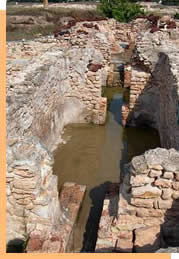 |
| |
 |
 |
Hear the siren song that calls you to Tunisia. This hospitable land of colours and contrasts, spices and scents invites you to enjoy its natural beauty, ancient cities, lively festivals and warm friendliness of its people. Welcoming visitors to its shores has long been an honoured Tunisian tradition and an impressive infrastructure of modern hotels, restaurants, international airports, tourism offices and information centres has been developed to add to our guests comfort and pleasure.
In this land of familiar and exotic spots, one can watch the sunrise over the Sahara, enjoy a gourmet meal at a seaside resort and top off the evening with a midnight swim in the pool of a modern comfortable hotel.
Whether you prefer a long walk along miles of sparkling beaches, wind surfing the cool Mediterranean breezes, exploring ancient sites and legendary cities a game of golf or just a long lazy day relaxing on the warm golden sands, Tunisia has it all: |
|
 |
|
| |
 |
 |
 |
 |
An ideal climate, a long and gentle seacoast, Tunisia, the northernmost country of Africa has for over 3000 years witnessed the passage of Phoenicians, Romans, Vandals, Byzantines, Turks, Spanish and French. They came as fugitives or adventurers, to conquer or to claim, warriors and missionaries, traders and farmers each leaving a part of their story in stone or mosaics, on hills of Carthage and the threshold of the Sahara.
This heritage, Tunisia's greatest wealth has been held in trust and preserved in hundreds of sites and museums from the small Punic museum in Utica to the vast collections of the prestigious National Museum of Bardo. Most Museums are closed on Mondays, whereas many on-site archaeological museums and ruins are open all week. An entrance fee is usually charged and a caretaker will often act as a guide.
The original inhabitants of Tunisia were the Berbers, followed by settlers and tradesmen from throughout the Mediterranean basin.
Throughout the centuries, Phoenician, Roman, Byzantine and Visigoth settlers, colonizers and traders intermingled with the population. However it was the Arabs who, in the 7th century, exerted the most influence and established themselves permanently. Bedouin tribes from the east arrived in the 11th century and further reinforced the Arabic language and Moslem religion. The Berbers initially resisted assimilation retreated to the mountains, the island of Jerba, or the arid regions of the south behind their earthen fortresses, ksours. Centuries of intermarriage and trade broke down their isolation.
|
|
|
| |
 |
 |
The Tunisian of today, city dweller, rural farmer, inhabitant of the desert or the mountains is proud of his "Tunisian identity", a composite of various civilizational influences. Aware of their rich historical heritage, Tunisian people show a genuine
interest and definite respect for others as evidenced in their moderation, tolerance
and hospitality.
Tunisians are quick to give directions and any form of assistance to the visitor who asks for help. The overwhelming majority speak Arabic and French. With modern education, English is taught today in all schools and is increasingly spoken especially by younger people. Some German and Italian are also spoken.
All these cultural, social and natural mosaics can be best enjoyed when visiting that
tourist haven: Hammamet.
For foreigners and Tunisians alike Hammamet is another world for vacations and sunbathing on spotless beaches where you can enjoy the gasp of cool water on, dinner on the patio of a beachfront hotel, midnight swims, discos and watching the sun rise in the mirror of the sea.
Hammamet, the "Tunisian Saint Tropez", is all this and more. It’s a way of life, there you can take your time to relax, meet old friends and make new ones. Its fishermen in brightly painted boats set out at dawn. The medina surrounded by its ramparts and crowned by an ancient fort overlooking the sea teems with fashionable boutiques crammed with resplendent traditional tunics and caftans rival the shimmering sun.
The Gulf of Hammamet shelters miles of fine sandy beaches, sparkling seas and modern hotels dedicated for the comfort and well-being of their guests. A variety of sea sports, folklore, exhibitions, festivals and amusements are provided for an ideal memorable vacation.
The venue place will be the “Magic Life Africana Imperial Hotel”. One of the finest hotel's in the city of Hammamet.
|
|
|
|
|
|


